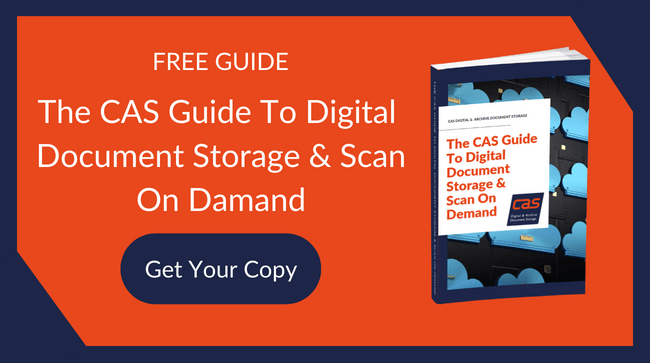Digitisation saves space and time, and can also improve data security. By transferring your paper records to computer files via CAS's bulk scanning services, you can make your archives more accessible, manageable, and preservable. Digital documents can be password protected, indexed, and transferred via the Internet to save you time, money, and effort.

However, there are also benefits, in some cases, to keeping the original paper copies of your vital documents - or not digitising them at all. While UK data protection law doesn't necessarily require you to retain two versions, you shouldn't underestimate the practical and legal advantages of having verifiable, unalterable, dated paper backups. Some ultra-sensitive printed material may also be best kept hidden, solitary, and offline for security reasons.
Here's our short guide to why (some) paperwork is still essential.
1) Future Format Compatibility And Legibility
If you are going to be retaining a document for more than five years, the chances are that digital storage formats will be updated and considerably improved in that time.
Once cutting-edge storage media such as microfiche, tapes, VHS, CDs, 3 1/2'' floppy disks, and DVDs (remember these?) have become rapidly outdated in the past twenty years. Dealing with suddenly obsolete electronically-stored documents can be tricky. Converting legacy files to a readable, modern format can prove expensive, time-consuming, and may require rare and difficult to find readers.
Digital images can also suffer copy degradation and develop visual 'artefacts' between hard-copy conversions and transfers. Too many 'jumps' can severely reduce legibility and verifiable marks. Periodic reimaging with up-to-date tech solves these issues. If a permanent paper copy still exists in storage, another scan or transfer is never off the table.
2) Image Quality And Resolution Size
Similarly, realistic per-item image scanning quality and resolution sizes will only increase with advances in scanning technology. If you keep hold of your paper copies, your organisation may be able to order higher-quality scans from the paper originals in ten, twenty, or fifty years.
3) Anti-Cyberattack Measures
Today, the second most secure files in existence are on computers not connected to a network. The most secure documents aren't digitised at all. By keeping ultra-sensitive written information paper-only, the bar that hackers need to clear to copy or steal secret documents raises considerably. A heist from a guarded, monitored facility is far trickier to fund, plan, and execute than a digital hack.
4) Authenticity And Verification
From time to time, you may have to provide certain third parties with a two-step guarantee that your digital documents are indeed legitimate. Digital certification is far too easy to backdate and forge with some basic font finding and editing skills.
Having the original documents ready for reference helps solves disputes over veracity. Any fraudulent discrepancies between versions and collections quickly becomes visible. You can track any later legitimate changes made to records, too.
5) Irreversible Destruction
How can you be sure that any archive material marked for destruction is truly gone? While electronic files can be quickly deleted or scrambled, the risk remains of leaving 'shadow' copies on disks or media. These 'footprints' are easily restorable with off-the-shelf recovery software. There's also the chance that cached, inserted, and unauthorised record copies might survive elsewhere (e.g. network drives) when their source is long gone.
Unintentional retention could potentially put you at risk of fines, fraud, and prosecution. Paper disposal ensures that any permanent destruction of records ordered is binding and absolute. Fine shredding, incineration, and high-grade recycling are a firm guarantee that any sensitive information won't linger on after its cut-off date.
Safe And Secure Document Storage From CAS Ltd.
At CAS, we provide 24-7 CCTV-monitored and RFID-tracked deposit box protection for all types of sensitive document. Learn more about how we can keep your confidential documents safe from prying eyes.
Image Source: Pexels

